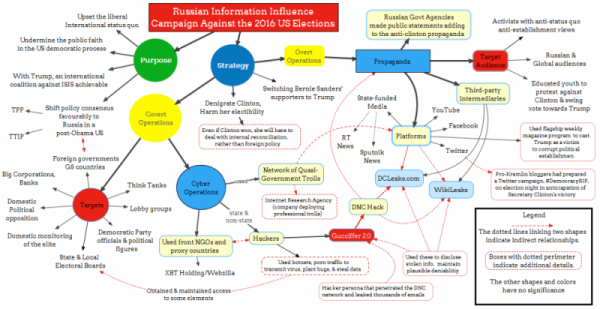The details: “About two weeks ago we identified the first of eight Pages and 17 profiles on Facebook, as well as seven Instagram accounts, that violate our ban on coordinated inauthentic behavior,” said Nathaniel Gleicher, the company’s head of cybersecurity policy, in blog post. Those pages and accounts have been removed.
- “In total, more than 290,000 accounts followed at least one of these Pages, the earliest of which was created in March 2017,” Gleicher said. “The latest was created in May 2018.”
- The New York Times was the first to report that the company had identified the operation.
What they’re saying: Gleicher said Facebook has not attributed the campaign to a specific actor like Russia’s Internet Research Agency, which was behind the 2016 campaign.
- There are some similarities to what they say before and after the 2016 elections, and Facebook found evidence of some connections between recent accounts and IRA accounts that were disabled last year.
- But there are also differences: “For example, while IP addresses are easy to spoof, the IRA accounts we disabled last year sometimes used Russian IP addresses. We haven’t seen those here,” Gleicher said.
Facebook COO Sheryl Sandberg told reporters that the company is still investigating: “This is an early stage for us to be sharing this information because we don’t have perfect information.”
The content included several related to divisive political issues.
- One post released by Facebook was posted by a page called “Resisters” and featured an image of President Trump with the text: “If Trump wants to beat Barack Obama’s Twitter record for most liked tweet he only needs to tweet 2 words ‘I resign.'”
- The same page also created an event for a counter-protest to the upcoming ““Unite the Right” rally in Washington. “Inauthentic admins of the ‘Resisters’ Page connected with admins from five legitimate Pages to co-host the event,” said Gleicher.
- Though the company released some sample posts from the pages, Facebook officials said on a call with reporters that it would not get into the broad details of the content — beyond what it had released publicly — but were working with researchers to evaluate it.
*** Early patterns, language and tactics are once again pointing to Russia, however that is not confirmed.
CNet: Facebook has discovered a new campaign of “inauthentic behavior” that’s used dozens of Facebook pages and accounts, and $11,000 worth of ads, to promote political causes prior to the US midterm elections, the social network said Tuesday.
The world’s largest social network is already in the hot seat with lawmakers over its role in the 2016 US presidential election. Russian trolls affiliated with the Kremlin-linked Internet Research Agency used a combination of paid ads and organic posts to spread misinformation and sow discord among voters ahead of the election.
In the wake of the scandal, Facebook made several changes to its advertising operations. They include a stricter verification process for political ads, and labeling ads with who paid for them. On Tuesday, Facebook’s head of cybersecurity policy, Nathaniel Gleicher, wrote in a company blog post that his team couldn’t say for sure who was behind the new campaign.
“Some of the activity is consistent with what we saw from the IRA before and after the 2016 elections,” Gleicher said. “And we’ve found evidence of some connections between these accounts and IRA accounts we disabled last year.” But there are differences as well, Gleicher said.
The people behind the new fake accounts are taking more steps to cover their tracks, and Facebook hasn’t found any activity coming from Russian IP addresses. What’s more, the ads were purchased in US and Canadian dollars.
Gleicher said there was a connection between the fake accounts and pages and planned protests in Washington next week.
Sen. Mark Warner, a Virginia Democrat who’s helped lead the Senate Intelligence Committee’s investigation into Russian efforts to influence the 2016 presidential election, said the news shows that social media remains a propaganda target for the Russians.
“Today’s disclosure is further evidence that the Kremlin continues to exploit platforms like Facebook to sow division and spread disinformation,” Warner said, “and I am glad that Facebook is taking some steps to pinpoint and address this activity. I also expect Facebook, along with other platform companies, will continue to identify Russian troll activity and to work with Congress on updating our laws to better protect our democracy in the future.”
Facebook said it’s working with law enforcement to investigate the campaign.


